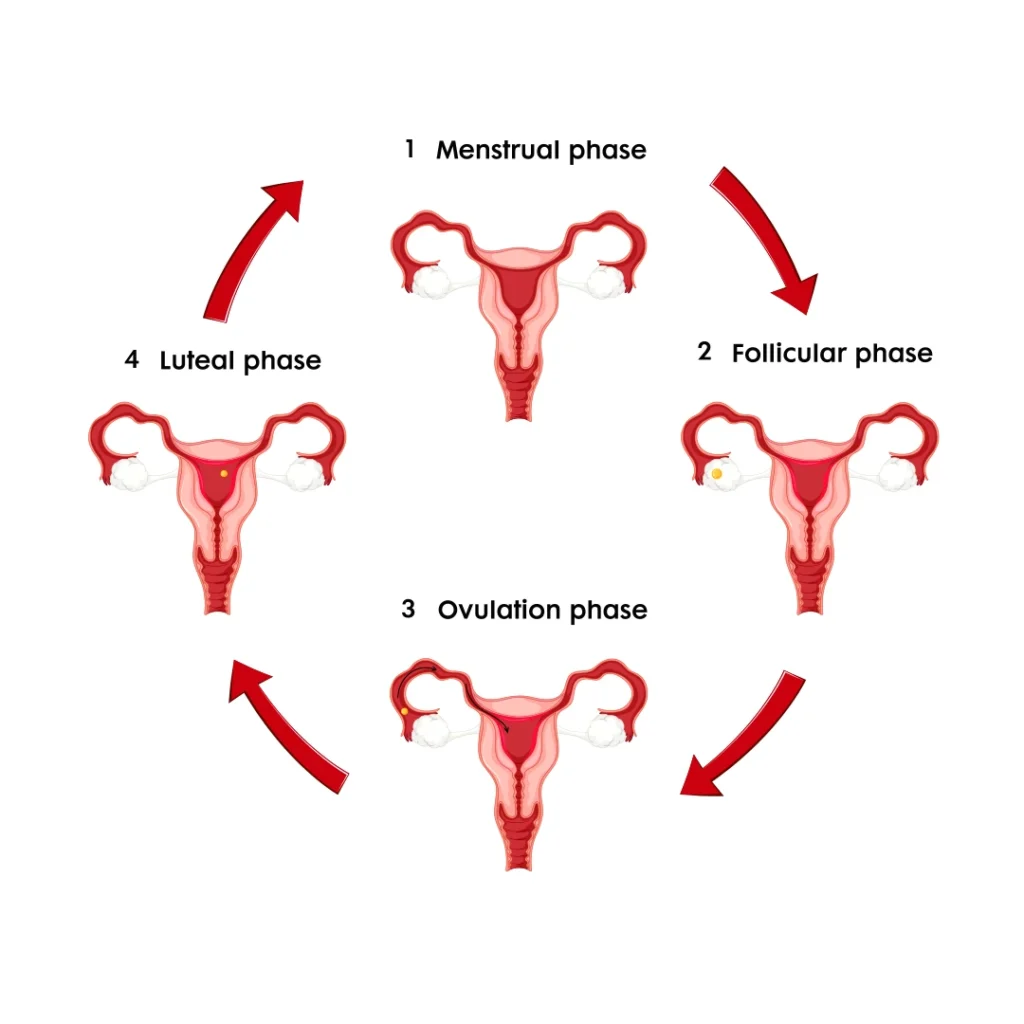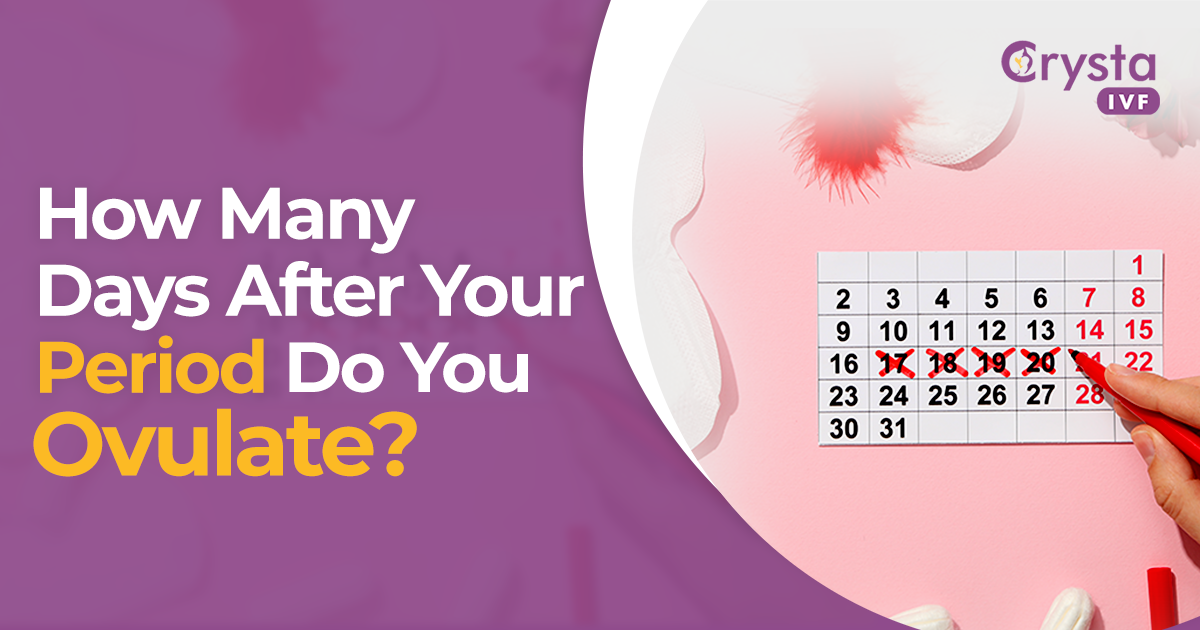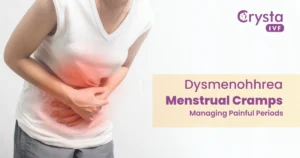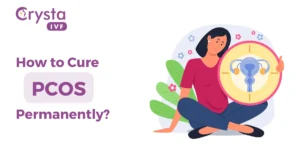Very few women have an idea of how the ovulation cycle works, how many days after their period they ovulate, and when their chances of getting pregnant are highest. Knowing a woman’s most fertile period, ovulation, and period cycle can help parents who are trying for a baby.
Ovulation occurs once a month and generally occurs halfway through the menstrual cycle. The duration of the menstrual cycle varies depending on several factors. Read the article to learn the exact ovulation time and signs to recognize it.
Is Ovulation Similar to Pregnancy?
Ovulation is one of the phases of the menstrual cycle. It occurs when fully developed eggs are released from ovaries and pass through the fallopian tubes, potentially leading to sperm fertilization. In order to provide room for a fertilized egg, the uterine lining thickens. If conception is unsuccessful, the lining sheds throughout the menstrual cycle.
Some symptoms of early pregnancy are similar to ovulation, but pregnancy usually occurs when a fetus is developed inside the uterus.
How Many Days After Your Period Do You Ovulate?
The monthly hormonal cycle the body goes through to prepare for a potential pregnancy is known as the Menstrual Cycle. Ovulation occurs once a month when an ovary releases an egg that enters the uterus through fallopian tubes and is ready for fertilization. If not, the body releases this as a menstrual cycle, during which the uterine wall begins to shed its lining.
A new menstrual cycle starts on the first day of a period. The average woman’s menstrual cycle lasts 28 to 32 days, while some women experience shorter or longer cycles depending on factors such as Hypertension, Stress, lifestyle, etc.
Hence, the ovulation date falls halfway through the menstrual cycle, between 11 and 20 days. Ovulation lasts one day between this time and varies from month to month. Shorter menstrual periods are associated with a higher likelihood of ovulation around day 11. Longer menstrual periods can cause women to ovulate closer to day 20.

According to 2015 research on Evolution and human Behaviour, a normal cycle of 28 days will likely have these different stages.
| Day of Cycle | Stage |
| 1 to 7 | Mensuration |
| 8 to 9 | Post-Menstruation |
| 10 to 14 | Ovulation Days |
| 15 to 16 | Post Ovulation |
| 17 to 28 | Luteal Phase |
What are the Signs of Ovulation?
Identifying the exact date of ovulation might be difficult. Most women trace their menstrual cycle and estimate the time of ovulation using various techniques. Here are some signs by which you can know that your body is undergoing ovulation.
- An increase in body temperature
- Soreness in the breasts
- One side of the abdomen experiences a dull aching
- Variation in cervical stiffness and fluid
- Heightened desire for sex
- Bloating in the abdomen
- An enhanced perception of taste, smell, or vision
- Increased luteinizing hormone levels
What are the Ways to Know That I am Ovulating?
Various methods are used to determine the time and day of ovulation. To be accurate and precise, any woman who wants to know her ovulation date must follow more than one method.
Through Calendar Record
Women who use the calendar technique must record approximately six months of menstrual cycles to know their ovulation timing. During six months, find the shortest and longest cycles to determine when you might be ovulating. The shortest cycle is generally calculated by reducing 18 days,, and the longest cycle is calculated by reducing 11 days from your 28 days menstruation cycle. Thus, your ovulation period occurs between day 11 and day 20 of the cycle.
Checking Body Temperature
During ovulation, your body temperature rises slightly (usually by 0.5 to 1 degree). Check your temperature each morning using a digital thermometer. This technique only functions if you take your temperature before eating, drinking, and getting out of bed. Keep recording your body temperature for a few months continuously, and mark out the days when your body temperature rises.
Noticing Cervical Mucus
Your cervix secretes a vaginal fluid called cervical mucus. During your menstrual cycle, your cervical mucus changes. Before ovulation, your cervical mucus is thick, white, and dry. Like egg whites, your cervical mucus becomes slick and transparent right before ovulation.
Using Ovulation Kit
The ovulation kit functions similarly to at-home pregnancy tests as it needs you to pee on an indicator strip in the comfort of your own home. They function by identifying luteinizing hormone, or LH, in your urine. If the result of the test is positive, you should be sure that you are about to ovulate in the coming 36 hours.
How Ovulation Affects Fertility?
The ovulation period is the accurate period for conceiving a child. Parents who engage in sexual activity between five days before ovulation and one day following it are more likely to become pregnant.
Additionally, the likelihood of conception increases with proximity to ovulation. During ovulation, the egg travels to the fallopian tube, where it meets with the sperm, and fertilization takes place. If fertilization does not occur within 24 hours of the release, the egg is dissolved.
The Bottom Line
Ovulation is a typical stage of the menstrual cycle during which the ovaries release eggs to prepare them for fertilization. It is how the body prepares for pregnancy.
Everybody’s menstrual cycle is not the same length. As such, an individual must maintain a cycle record to conceive. In case you are still confused with your menstrual cycle or ovulation period, consult with an expert doctor at Crysta IVF. We have highly experienced doctors who provide personalized care and treatment to each patient.
Frequently Asked Questions
Ques. Can I get pregnant after five days of my periods?
Ans: Having unprotected sex during any time of the menstrual cycle can get you pregnant. The highest chance of getting pregnant is during ovulation, although one can get pregnant after five days of the period.
Ques: How do I know if I am ovulating?
Ans: If you can observe a thick mucus layer in your underwear or you have soreness in your breast, there is a high chance that you might be ovulating. Some other common ovulation symptoms include dull aching, abdominal pain, and increased body temperature.
Ques: How do I calculate my fertile days?
Ans: The fertile days are commonly known as Ovulation. Your menstrual cycle starts on the first day of the period, and exactly between 11 to 20 days, you might experience ovulation. These are the most fertile days in which you can get pregnant.
Ques: How many days after your periods can you get pregnant?
Ans: You can get pregnant anytime, even during your period. The chances are higher between 11 to 20 days of your menstrual cycle.
Ques: If my period lasts three days, when do I ovulate?
Ans: The ovulation cycle begins on the 11th day of your cycle. The ovulation will generally occur on the 14th day of the cycle, which can vary from person to person.




